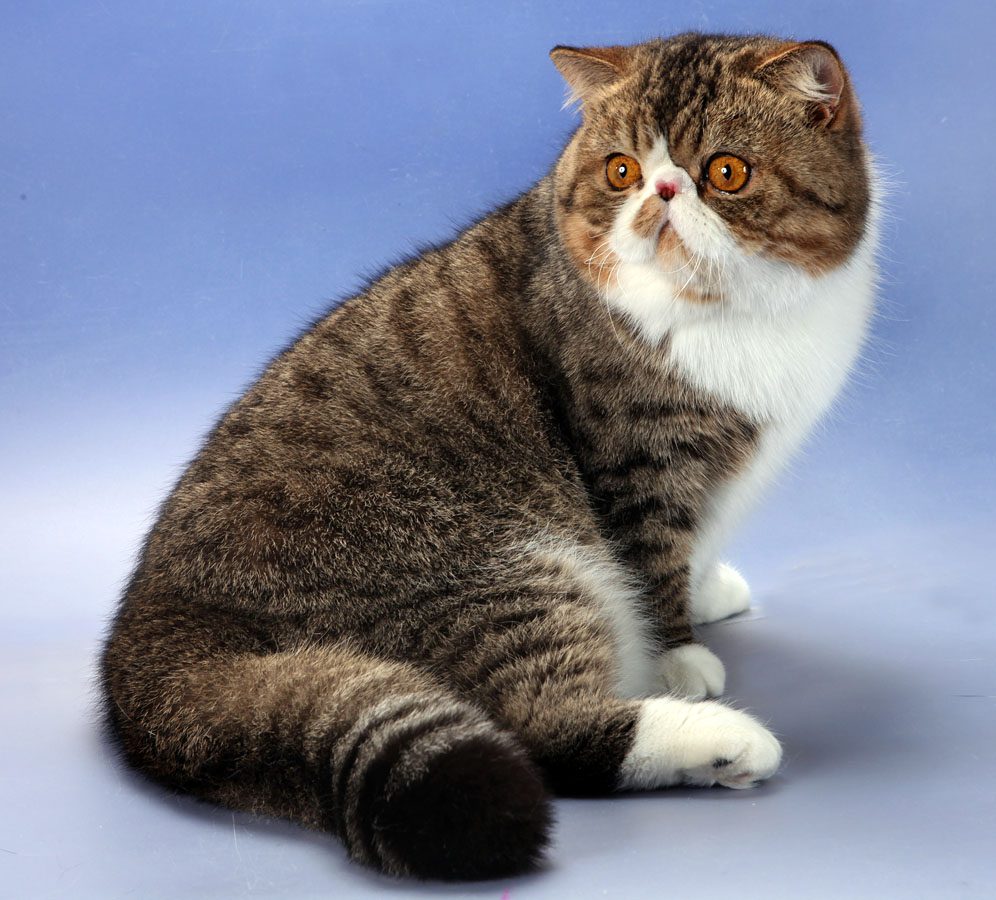Content |
|---|
Characteristics "Exotic Shorthair"
Coexistence is important that you have with your new friend. Before considering the acquisition of a cat of the breed "Exotic Shorthair" you know certain factors. You must take into account their character, their need for exercise, their interaction with other pets, their care and if you have small children, their level of tolerance towards them.
Joy3.0 out of 5 stars (based on 1 review)
|
Activity level1.0 out of 5 stars (based on 1 review)
|
Friendliness to other pets4.0 out of 5 stars (based on 1 review)
|
|---|---|---|
Friendliness to children4.0 out of 5 stars (based on 1 review)
|
Grooming requirements2.0 out of 5 stars (based on 1 review)
|
Vocality1.0 out of 5 stars (based on 1 review)
|
Need for attention4.0 out of 5 stars (based on 1 review)
|
Affection towards its owners5.0 out of 5 stars (based on 1 review)
|
Docility5.0 out of 5 stars (based on 1 review)
|
Intelligence2.0 out of 5 stars (based on 1 review)
|
Independence2.0 out of 5 stars (based on 1 review)
|
Hardiness2.0 out of 5 stars (based on 1 review)
|
History
The Exotic Shorthair has its origins in the years 50 in United States. In fact, It is at this time that some breeders of the American Shorthair Cat, known at the time as Domestic short-haired cat, decided to cross it with silver Persians to introduce this color so sought after in the Persian cat, as well as the green eyes that accompany it. The resulting kittens did inherit this coat color and were beautiful., but they did not conform to the standard of the American shorthair cat: beefier, with a rounder head and thicker, longer coat, they had inherited part of the appearance of the Persian.
His existence was, in any case, very controversial, since most of the breeders of the American shorthair cat they feared that these crosses would distort the breed. The breed standard was revised to prohibit crosses with other breeds, so the future of these new cats was compromised.
Salvation came from the hand of some breeders of the Persian cat What, like Jane Martinke, judge of the Cat Fanciers’ Association (CFA), saw the potential to develop a new breed. Initially called the race Sterling, for the beautiful silver color of the first specimens. At the same time, another persian breeder, Carolyn Bussey, set out to develop a “Persian cat” short-haired crossing Persians with Burmese.
Little by little, other Persian breeders joined the program, also introducing the Russian Blue Cat.
In the Decade of 1960, as the “Persian cat” short hair already showed many colors, the name was dropped Sterling. In 1967, the CFA recognized the breed under the name of “Exotic Shorthair” and allowed him to compete in the feline shows organized under his auspices.
It was also one of the breeds recognized by the International Cat Association (TICA) when it was founded in 1979. Refering to Fédération International Féline (FiFé), did not recognize her turn until 1983.
One of the CFA's Great Exotic Champions, a black male named Purrfun My Main Man, was imported to Britain in the early 1990s. 1980 and led to the development of the breed in Europe, including recognition by the British Governing Council of the Cat Fancy (GCCF). But, a large part of Britain's shorthair exotics are the result of crosses between the Persian Cat and the British Shorthair cat, unlike North American specimens, whose origins mix nothing less than 4 different races (Persian cat, American shorthair cat, Russian Blue Cat and Burmese cat).
The issue of authorized crossings has been debated for a long time, and the rules have evolved in this regard. Already in 1987, the CFA prohibited any crossing of the Exotic Shorthair with a race other than him Persian cat, and the GCCF did the same 13 years later, in 2000.
As a result, the Exotic Shorthair can be considered simply a short-haired version of the Persian cat, since it has the same physical characteristics, except for the length of its fur. The vast majority of feline associations have thus unified their criteria, so that both races share the same standard. The Exotic Shorthair is often referred to as the “Lazy persian” because it has all the qualities of Persian cat, but without the inconvenience of having to maintain their long coat on a daily basis.
The Exotic Shorthair it is now one of the most popular breeds in its country of origin, and on average the second most popular cat breed in America in terms of CFA registrations.
They are also popular in Europe, although not as much as in North America. These may include, is in the Top 10 of the most popular cat breeds among the French, with about a thousand registrations a year in the Livre Officiel des Origines Félines (LOOF), that is to say, almost double than in the middle of the years 2000. So, represents around the 2,5% of the population of French cats.
The situation is quite different in Great Britain, although it also represents around the 2% of the cat population. In fact, at the end of the Decade of 2010, there were only a few 350 registrations per year in the GCCF, versus more than double in the previous decade. The cat is no longer one of the 10 most popular breeds in the country.
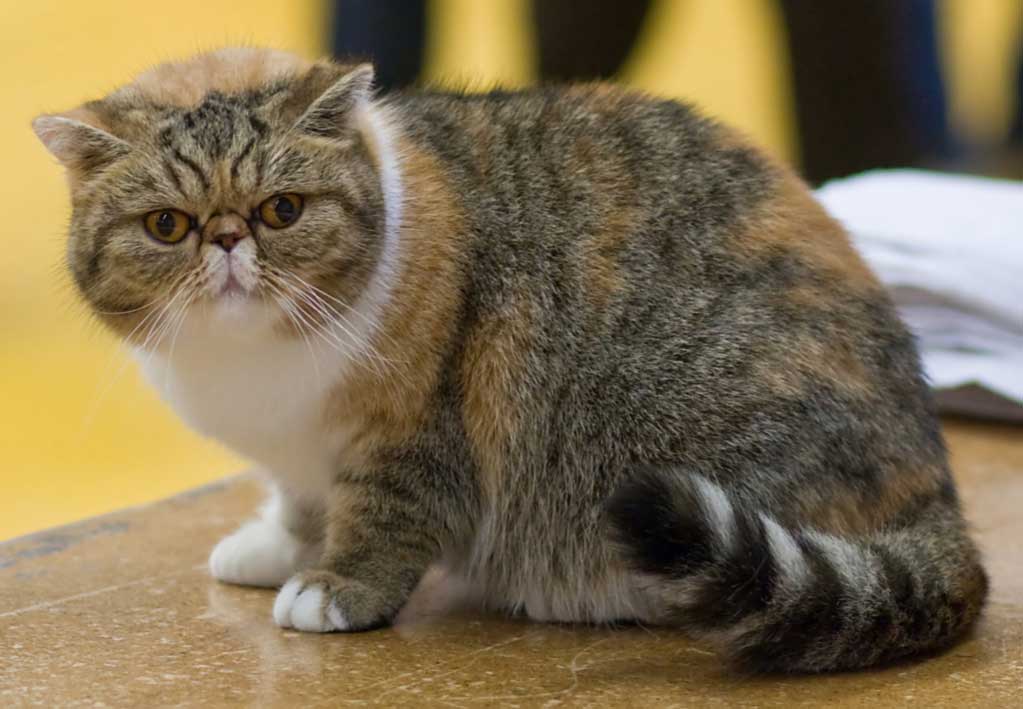
Physical characteristics
The Exotic Shorthair It is a medium-sized cat with an appearance identical to that of the Persian cat, whose standard shares: the only difference is that it has a short coat.
Its body it is solid, wide and muscular. Their legs, powerful and with a solid bone structure, they are rather short. The same goes for the tail, worn straight instead of curved.
The head it is solid and round, with a wide skull. Viewed from the side, the eyes, that can be of different colors depending on the fur that is worn, are clearly prominent, and forecrown, the nose and chin are vertically aligned. The nose upturned is short and wide, while the ears are rather small and rounded.
The fur of the Exotic Shorthair it is dense and silky, somewhat bristly due to the presence of a thick undercoat. The coat is slightly longer than that of most short-haired breeds..
The coat can be of any color, and all the patterns are also accepted by the breed standard.
Last, there is very little sexual dimorphism: there are no major differences in size or height between males and females.
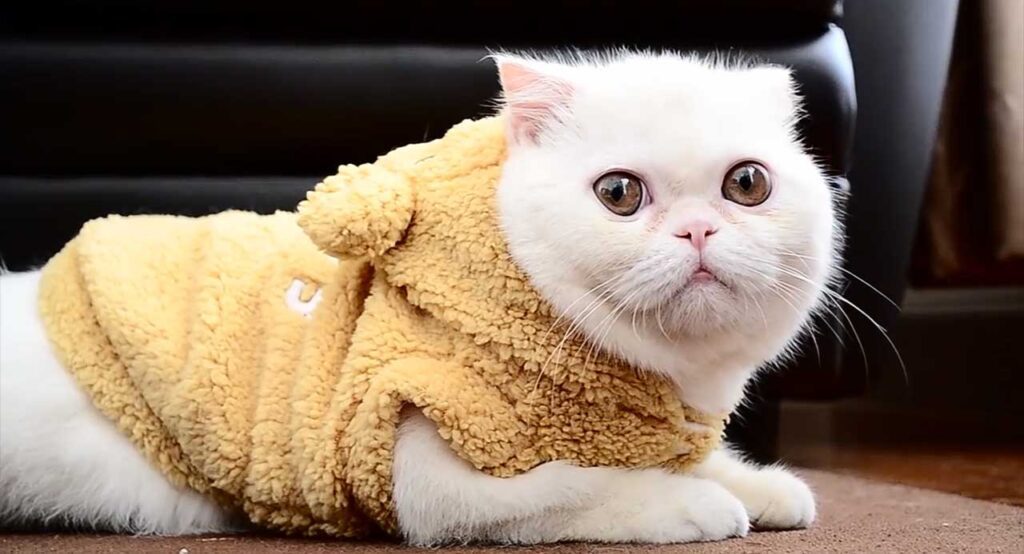
Size and weight
- Male size: 20-25 cm.
- female size: 20-25 cm.
- Male weight: 3 to 5 kg
- female weight: 3 to 5 kg
Varieties of "Exotic Shorthair"
The numerous crosses with the Persian cat have left many long-haired recessive genes. When two parents of “Exotic Shorthair” shorthaired with this gene are paired, each of their young has a one in four chance of being longhaired.
This variety divides the different organizations: are not allowed to compete for the Cat Fanciers’ Association (CFA), its representatives are a breed apart for the American Cat Fanciers Association (ACFA), while the International Cat Association (TICA) considers them Persians full-fledged.
Character and skills
The Exotic Shorthair it is a calm and serene cat, very affectionate with his family. They like to follow their owners around the house and jump on their knees when they sit down.. To the males, in particular, they like to snuggle and purr quietly with their owners, whether they are adults or children who have learned to behave with animals.
Due to its sociable and relaxed nature, does not pose problems of coexistence with other dogs or with dogs accustomed to cats. On the other hand, small rodents or reptiles can arouse their predatory instincts: you better not wait for this little world to live under the same roof, at the risk of being exposed to unpleasant surprises.
Even though they love their family, the Exotic Shorthair is more reserved with people they do not know. It takes them some time to get used to your presence, but once they've earned your trust, they are welcomed with unbridled affection.
Due to his closeness to family, this cat does not like to be left alone for a long time and can easily suffer from separation anxiety. The presence of other animals and/or the opportunity to play with different puzzles for cats that stimulate them intellectually are ideal for getting them through the day without difficulty when their owners are at work., but it is not a recommended cat breed for someone who is out and about often.
But, not an intrusive or attention seeking partner. They like their owners to be present and do their best to be as close to them, but they are perfectly content to sleep next to them without disturbing them if they are busy.
He is also able to learn some simple commands like “Sit down!” and, unlike most other breeds, seems to understand the meaning of “¡No! If you are prohibited from going around the dining room table two or three times, is likely to remember and obey.
On the other hand, although they share the calm character of Persian cat, the Exotic Shorthair is generally a little more active than the Persian, having retained part of the playful character of the breeds of shorthair of which descend. They love to play, chase a ball, jump for a toy… They are also very curious and marvel at the simplest things: they can be seen standing for hours by the window watching the wind play with the leaves, or sitting on the edge of a sink counting the drips from a poorly closed tap.
Last, rarely heard, so it is not very noisy. In fact, his voice is quite soft and pleasant.
Grooming and caring for the "Exotic Shorthair"
"Exotic Shorthair" |
||
|---|---|---|
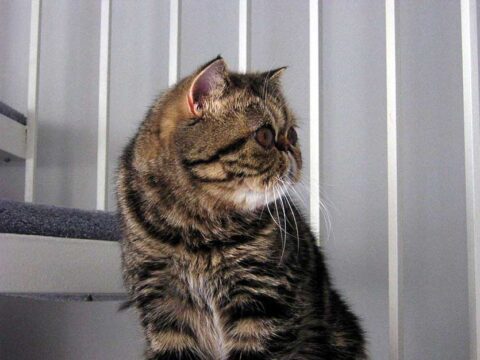 | ||
The Exotic Shorthair receives the nickname of “lazy persian” for good reason: It is a simple and easy-care breed of cats.
In fact, its short coat does not knot, and brushing the cat with a comb once a week is enough to keep its coat in good condition. But, during the fall and spring shedding periods, brushing should be more frequent to remove all dead hair.
Otherwise, just spend a few minutes after each brushing session to make sure his teeth and ears are clean and to wipe the corners of his eyes with a damp cloth, in order to avoid any accumulation of dirt. This last point is especially important since, because of the shape of her face, this cat is more likely than others to have crying eyes.
Last, claws should be trimmed when they get too long.
Indoor or outdoor cat?
Basically, the Exotic Shorthair is an ideal indoor cat who simply enjoy life with their humans and are quite frugal. But, like all cats, they are happy if they can be given access to the outside, Since, despite his calm nature and little need to move, they can enjoy a nature walk.
Unlike other races, the Exotic Shorthair usually have a small radius of movement when allowed to roam freely, so their forays never take them far from home, where the cozy sofa awaits you, the well-filled food bowl and, of course, their caregivers.
Thanks to his calm and caring nature, these purebred cats are not disturbed by a turbulent family life with lively children, and they can also enjoy life in a quiet individual apartment without any problem. Whether it is kept indoors or combined with the possibility of access to the outside, both are possible without complications, since it is only important that the Exotic Shorthair don't be alone for a long time, because he likes to socialize and, therefore, it's a good idea to provide a playmate so he doesn't have to be alone if you're away for a longer period of time. Whether it's a second cat or a dog, to the Exotic Shorthair he loves to have company.
How much activity does he need? "Exotic Shorthair"?
Thanks to your barely pronounced need to move, the Exotic Shorthair it is also very austere in terms of activity. But, these intelligent purebred cats like to be challenged in an intelligent way. It also, as owner of a Exotic Shorthair you would do well to motivate them to exercise, since cats can tend to be overweight.
Due to your intelligence and patience, Clicker training is a good way to keep your child busy. Exotic Shorthair. Nor should there be a lack of climbing opportunities and toys, because even if it is a cat a little lazy, gratefully accepts play offers and climbing opportunities. Tame cats can be encouraged to be more active, especially with food.
Health and nutrition
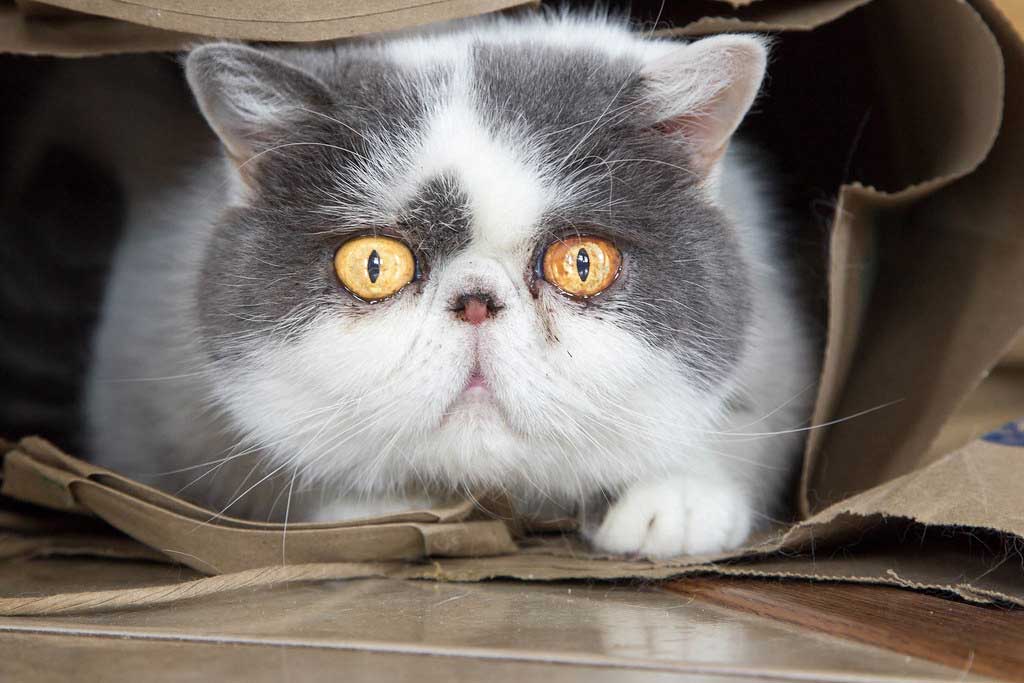
This cat is especially susceptible to the following conditions
- The renal polyquistosis, a genetic disease that causes numerous cysts in the kidneys and that today can be detected with a DNA test;
- Dermatitis seborreica, causing redness and blemishes on the skin;
- The had, a skin disease caused by a fungus;
- Respiratory problems due to their narrow nostrils;
- Eye diseases like entropion, an inward turn of the eyelid, or the cherry eye, when the lacrimal gland pops out of its orbit and can become infected.
It also, the Obesity it is a risk to the health of any cat, especially if you live in a flat, and the Exotic Shorthair is no exception to the rule.
It must also be taken into account that the increasingly shorter nose and the associated deformation of the entire skull can become a real torment for animals. The result is severe respiratory and eye problems. So, the trend in the Exotic Shorthair it is towards noses more and more “natural” to prevent breeding by torture.
Last, it is a breed of cat sensitive to heat. So, it is important to ensure that the temperature in your cabin is never excessive. If the mercury goes up a lot in summer, the ideal is to put it in a room with air conditioning.
Life expectancy
14 to 16 years
Food
The Exotic Shorthair is not picky about food, and can be fed commercial cat food without any problem. But, to keep your cat healthy, you should choose a quality food that is appropriate for your age and activity level and that provides you with all the necessary nutrients and vitamins.
But, the flat face of some cats makes it difficult for them to chew and swallow, depending on the shape of the food. So, do not hesitate to try different types of croquettes and foods until you find the one that suits you best.
For sale "Exotic Shorthair"
The average price of a Exotic Shorthair round the 1.000 EUR, regardless of gender.
But, this average hides great disparities, since the prices range from 500 euros from a kitten with defects compared to the standard up to 4.000 euros of a specimen with prestigious ancestry and physical characteristics intended for cat shows.
Videos "Exotic Shorthair"
|
Gato exótico de pelo corto
|
Cuidados del Gato Exótico: Un Felino Curioso
|
|
Exotic Shorthair Cat Review after 5 years
|
7 Reasons Why You Should Own An Exotic Shorthair Cat
|
